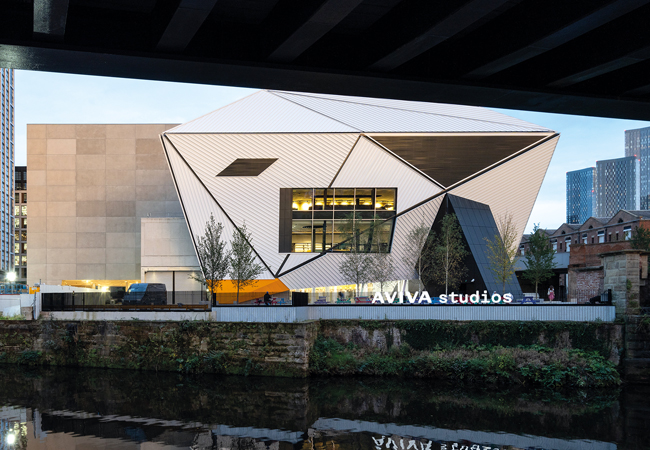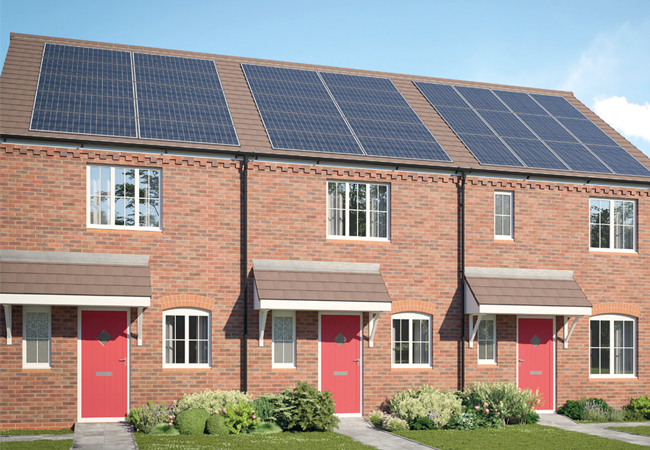
Octopus Energy will guarantee zero energy bills for five years in Bellway Homes’ scheme
Reports that energy bills in Britain are predicted to rise by 5% next year will have come as worrying news to many households… but not all.
Zero Bills is an initiative by Octopus Energy. It is marketed as ‘a world-first smart proposition that allows customers to move into homes that have no energy bills for at least five years, guaranteed’. The claim is that Zero Bills households will save around £1,800 on energy bills compared with those on a standard variable tariff, based on current energy rates.
To date, close to 1,000 homes across the UK have been accredited under the initiative by Octopus Energy, through contracts with developers and housing providers. That number is set to escalate with news that Bellway Homes, one of the UK’s major housebuilders, has agreed a long-term partnership with the energy provider to deliver ‘Zero Bills’ homes at scale
Bellway Homes is partnering with Octopus Energy in anticipation of being able to deliver Zero Bills homes on its developments. Initially, it is starting small: the housebuilder is trialling the Zero Bills scheme on three test homes, which it has built to the expected Future Homes Standard, at its Victoria Gate development in Stafford. From 2024, however, Bellway plans to build a further 250 Zero Bills homes at a development in Bedfordshire, with the potential for more sites to follow. ‘We’re working with Bellway to see how many of the homes it has already designed will be suitable for Zero Bills accreditation on its upcoming sites,’ says Banks.A bellwether for zero energy bills homes?
To sign up for the scheme, a house must be off the gas grid, be heated by an electric source – such as a heat pump – be kitted out with solar PV and a battery, and have a broadband connection. These technologies are then optimised by Kraken, Octopus Energy’s technology platform, to put power on to the Grid, as well as pull it from the Grid.
‘Effectively, we’re looking to generate more energy than the house is expected to typically use, through smart control of the equipment, so homes will be operationally zero carbon on an annual basis,’ says Nigel Banks, technical director Zero Bills and low carbon homes at Octopus Energy.
This will involve charging the battery at night, when energy is cheap, or using free electricity generated by the solar panels during the day.
‘We’ll have the ability to export solar from the roof and from the battery, so we can generate revenue from exporting that free energy, which is how we can make Zero Bills commercially viable,’ Banks explains.
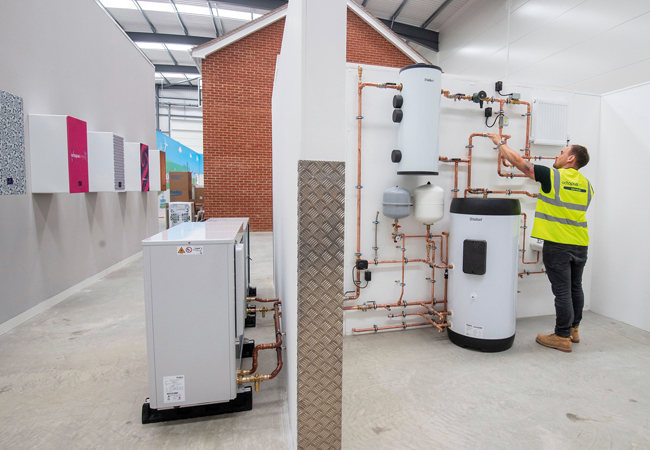
Octopus Energy’s research facility in Slough
To be accredited as suitable for the scheme, a housebuilder must confirm a home’s expected heating and hot water consumption, along with its expected solar-generated power. According to Banks, Octopus Energy will ‘use its data’ on the amount of energy used for unregulated appliance and cooking use. ‘From that information, we will define an agreed specification with the housebuilder, which it then builds so we can accredit it as a Zero Bills home,’ he explains.
Octopus acknowledges that geographical location will have an impact on eligibility. Homes in Scotland are likely to need a larger solar array and better thermal insulation to be eligible. If, having run its analysis, a plot is found not to meet the scheme’s criteria, the energy provider will recommend design changes to ‘unlock eligibility’.
Approved suppliers
The home’s heat pump and battery must be able to integrate with Octopus Energy’s technology, so the energy provider can optimise and control its operation, says Banks. ‘We don’t tell housebuilders which model or type of kit to install, but it does have to be from our list of integrated suppliers, so we can optimise the equipment’s operation remotely,’ he adds. ‘This includes most of the main air source heat pump brands, along with GivEnergy batteries.’
Typically, a battery will need to be sized to provide between 10kWh and 14kWh of power, while the PVs will be expected to deliver between 8kWp and 12kWp – which, Banks admits, is ‘quite a lot’. Generally, this will require housebuilders to fit PVs to both sides of a home’s roof to generate sufficient power.
To be accredited as suitable for the scheme, a housebuilder must confirm a home’s expected heating and hot water consumption, along with its expected solar-generated power
Zero Bills is not, in theory, confined to new-build homes. Octopus Energy says it is happy to assess any housing stock for compatibility. In practice, however, this means the thermal characteristics of existing homes must be at least as good as current new-build regulations.
Anyone purchasing a Zero Bills home will have Octopus Energy as their default supplier. To benefit from the guarantee of zero energy bills for five years, the customer will have to agree to the energy provider’s terms and conditions. ‘That means allowing Octopus to control the battery and heat pump settings in their home while they live and heat their home normally,’ says Banks. If customers are not happy, they are free to leave before the end of the five-year term.
Banks insists that handing over control of a home’s battery and heating to the energy provider is not as onerous as it might sound.
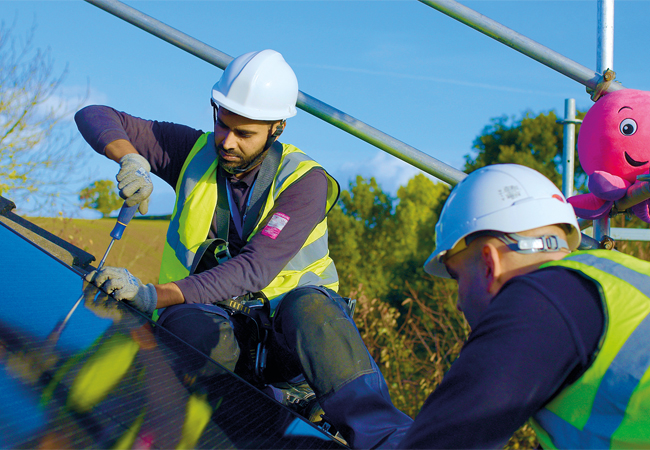
PVs will be expected to deliver between 8 kWp and 12kWp
‘The home owner sets the programmer on their thermostat as normal,’ he says. ‘In the background, we are looking for full optimisation control on the battery to deliver the heat temperatures at the times customers want – but we may choose to optimise when the heat pump is heating the domestic hot water, for example, and we may run the heating cycle slightly earlier if it is much more cost-effective to do so.’
By signing up for the Zero Bills scheme, householders are forfeiting the opportunity to earn revenue from their PV-generated electricity. ‘Effectively, it is zero pence per kWh export, zero pence per kWh import, with a zero standing-charge tariff – so you will not get paid for the energy exported, but then you are not paying for imported energy either,’ says Banks.
Fair-use policy
For customers who might think that signing up for Zero Bills is an opportunity to be profligate with their energy use, Octopus Energy’s terms and conditions include a ‘fair usage’ policy, which is currently set at double the consumption for a typical home.
Above this threshold, consumption is charged at Octopus Energy’s standard rate. Another caveat is that electric vehicle (EV) charging is not included in the Zero Bills scheme because, Banks says, an EV ‘can effectively double a home’s electricity consumption’.
In addition to helping eliminate stress and anxiety around the payment of household energy bills, which are typically around £1,800 per year, Banks says another benefit of the Zero Bills initiative is that it can be factored into mortgage lenders’ affordability calculations. This may allow home purchasers to borrow more money than they would otherwise be able to do.
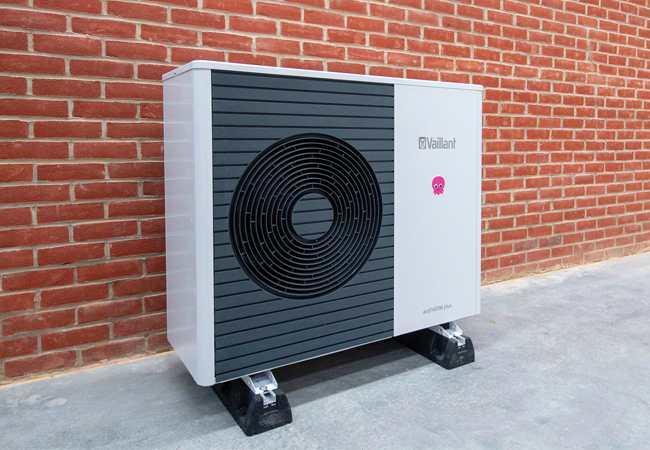
Heating from an electric source must be specified
‘One of the biggest barriers to adopting higher energy performance standards is that it costs money to increase the fabric spec and install additional kit,’ explains Banks. ‘Because we are guaranteeing zero bills, some lenders are willing to include that in their affordability calculation, to enable a customer to borrow more money’.
As more and more renewables are connected to the Grid, the time at which homes use energy will have a big impact on the carbon footprint and cost of that energy – which, Banks says, will be ‘almost as big as the amount of energy being used’.
The need for demand flexibility and energy storage to manage the intermittent renewables will only continue to increase.
Banks says: ‘It is the smart control of demand management behind Zero Bills that will minimise the infrastructure upgrades required on the Grid and help bring down everyone’s costs, so this really does work for everyone.



